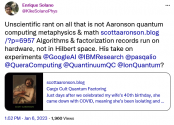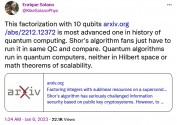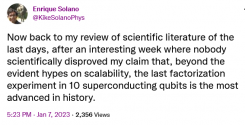Just a proposed method that can break 2048 bit Rsa using 372 quatum computer. Whether it is practical or not, it is unknownChinese researcher breaks RSA encryption with quantum computer new method?
You are using an out of date browser. It may not display this or other websites correctly.
You should upgrade or use an alternative browser.
You should upgrade or use an alternative browser.
Quantum computing thread
- Thread starter tphuang
- Start date
China's first Quantum computer intelligent data center has started operation in Taihu, Wuxi, Jiangsu. Looks like it will be used by various industries.
The company supplying Quantum computer is 图灵量子 TuringQ. They claim to be China's first optical quantum chip/computer company.
They claim to have the world's first commercial optical quantum computer
looks like 8.1 billion RMB capex deployed here to build this quantum data center.
The company supplying Quantum computer is 图灵量子 TuringQ. They claim to be China's first optical quantum chip/computer company.
They claim to have the world's first commercial optical quantum computer
looks like 8.1 billion RMB capex deployed here to build this quantum data center.
so this data center will be used for medicinal research, finance and AI technology. Estimated to reach 10 billion RMB in revenue per year.一期项目占地约45亩,建设以芯片设计为核心的高新技术产业园;二期项目占地82亩,将构建面向医药、金融、人工智能科技赋能的量子计算产业集群。项目达效后预计年产值超100亿元,年税收超10亿元。
CAS team uses new materials to create the world's thinnest quantum light source! With a thickness of 46 nm, a major breakthrough in quantum information research!
huge if true ..
IF IT SCALES to the same degree, it could be possible. But that's the key. It might not. Quantum computing is far beyond my understanding, but I know that in chemical industry, making something in a beaker and making a big vat of something is totally different.Chinese researcher breaks RSA encryption with quantum computer new method?
It is true:
CAS team uses new materials to create the world's thinnest quantum light source! With a thickness of 46 nm, a major breakthrough in quantum information research!
huge if true ..
Excerpt from the article's abstract:
"Notably, the strong second-order nonlinearity enables correlated parametric photon pair generation, through a spontaneous parametric down-conversion (SPDC) process, in flakes as thin as about 46 nm. To our knowledge, this is the first SPDC source unambiguously demonstrated in two-dimensional layered materials, and the thinnest SPDC source ever reported."
Guancha just had the Chinese news posted:
Reply to this News on China's scientific and technological development.
This is a scientific debate. People have different scientific perspectives on same epistemological reality




This is a scientific debate. People have different scientific perspectives on same epistemological reality




The company supplying Quantum computer is 图灵量子 TuringQ. They claim to be China's first optical quantum chip/computer company.
They claim to have the world's first commercial optical quantum computer
Aspirations of Jin Xianmin, the founder of TuringQ
I glanced over the paper earlier, and came to the same conclusion. QAOA is already kind of sketchy, this paper is basically a quantum computing research group, which happens to already have a working "quantum computer" with a decent number of working qubits. They managed to convert parts of a new trendy unproven algorithm related to classical factoring into quantum language and ran a program on their fancy machine to publish a paper. Great paper in terms of hype, will probably get lots of citations, but won't really advance the field of quantum computing.Reply to this News on China's scientific and technological development.
This is a scientific debate. People have different scientific perspectives on same epistemological reality
View attachment 104695
View attachment 104699
View attachment 104701
View attachment 104702
When China desperately needs investment in real technology, in engines, in semiconductors and biotech, Pan Jianwei and USTC‘s whole quantum nonsense just can't stop scaming chinese government's money.
Can't believe quantum computing still hasn't become another nuclear fusion already.
This is Scott Aaronson saying by the way. Scott Aaronson!Late that day, on January 4, Scott Aaronson, chair of computer science at The University of Texas at Austin, and director of its , offered a rebuttal with a succinct three word review of the paper: ""
Aaronson, among the more credible voices on such matters, hangs the researchers with their own caveat: "It should be pointed out that the quantum speedup of the algorithm is unclear due to the ambiguous convergence of QAOA," they wrote in their paper.
That's a vast understatement, Aarsonson argues, because it has yet to be demonstrated that Schnorr’s algorithm, even with QAOA, will work faster on a quantum device than a classical computer. And if a current laptop could break RSA, doing so on a quantum computer would be unnecessary.
"All told, this is one of the most actively misleading quantum computing papers I’ve seen in 25 years, and I’ve seen … many," he wrote.
But rather than focus on an experimental result for one particular machine, computer scientists want to know whether classical algorithms will be able to keep up as quantum computers get bigger and bigger. “The hope is that eventually the quantum side just completely pulls away until there’s no competition anymore,” said , a computer scientist at the University of Texas, Austin.
That general question is still hard to answer, again in part because of those pesky errors. (Future quantum machines will compensate for their imperfections using a technique called , but that capability is still a ways off.) Is it possible to get the hoped-for runaway quantum advantage even with uncorrected errors?
Most researchers suspected the answer was no, but they couldn’t prove it for all cases. Now, in a posted to the preprint server arxiv.org, a team of computer scientists has taken a major step toward a comprehensive proof that error correction is necessary for a lasting quantum advantage in random circuit sampling — the bespoke problem that Google used to show quantum supremacy. They did so by developing a classical algorithm that can simulate random circuit sampling experiments when errors are present.
But in between lies a Goldilocks zone. Before the new paper, it was still a possibility that quantum advantage could survive here, even as the number of qubits increased. In this intermediate-depth case, you increase the circuit depth extremely slowly as the number of qubits grows: Even though the output will steadily get degraded by errors, it might still be hard to simulate classically at each step.
The new paper closes this loophole. The authors derived a classical algorithm for simulating random circuit sampling and proved that its runtime is a polynomial function of the time required to run the corresponding quantum experiment. The result forges a tight theoretical connection between the speed of classical and quantum approaches to random circuit sampling.
The new algorithm works for a major class of intermediate-depth circuits, but its underlying assumptions break down for certain shallower ones, leaving a small gap where efficient classical simulation methods are unknown. But few researchers are holding out hope that random circuit sampling will prove hard to simulate classically in this remaining slim window. “I give it pretty small odds,” said
The result suggests that random circuit sampling won’t yield a quantum advantage by the rigorous standards of computational complexity theory. At the same time, it illustrates the fact that polynomial algorithms, which complexity theorists indiscriminately call efficient, aren’t necessarily fast in practice. The new classical algorithm gets progressively slower as the error rate decreases, and at the low error rates achieved in quantum supremacy experiments, it’s far too slow to be practical. With no errors it breaks down altogether, so this result doesn’t contradict anything researchers knew about how hard it is to classically simulate random circuit sampling in the ideal, error-free case. , the physicist leading Google’s quantum supremacy research, says he regards the paper “more as a nice confirmation of random circuit sampling than anything else.”
What does this mean? Very simple, computer computing without quantum error correction is just a scam.On one point, all researchers agree: The new algorithm underscores how crucial quantum error correction will be to the long-term success of quantum computing. “That’s the solution, at the end of the day,” Fefferman said.
Can't believe quantum computing still hasn't become another nuclear fusion already.
Uhh what? Pan Jianwei team did not participate in that specific paper.When China desperately needs investment in real technology, in engines, in semiconductors and biotech, Pan Jianwei and USTC‘s whole quantum nonsense just can't stop scaming chinese government's money.
This is Scott Aaronson saying by the way. Scott Aaronson!
What does this mean? Very simple, computer computing without quantum error correction is just a scam.
Can't believe quantum computing still hasn't become another nuclear fusion already.
